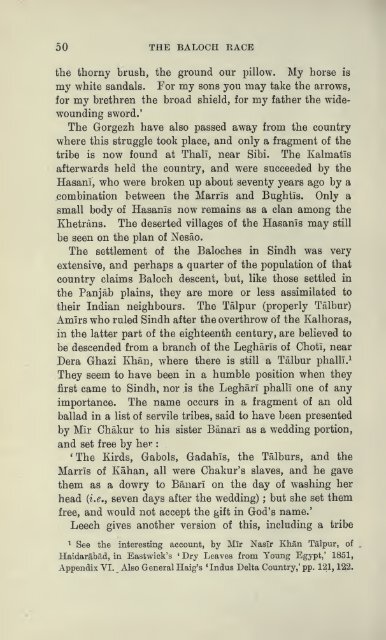You also want an ePaper? Increase the reach of your titles
YUMPU automatically turns print PDFs into web optimized ePapers that Google loves.
50 THE BALOCH RACE<br />
the thorny brush, the ground our pillow. My horse is<br />
my white sandals. For my sons you may take the arrows,<br />
for my brethren the broad shield, for my father the widewounding<br />
sword.'<br />
The Gorgezh have also passed away from the country<br />
where this struggle took place, and only a fragment of the<br />
tribe is now found at Thali, near Sibi. The Kalmatis<br />
afterwards held the country, and were succeeded by the<br />
Hasani, who were broken up about seventy years ago by a<br />
combination between the Marrls and Bughtls. Only a<br />
small body of Hasanis now remains as a clan among the<br />
Khetrans. The deserted villages of the Hasanis may still<br />
be seen on the plan of Nesao.<br />
The settlement of the Baloches in Sindh was very<br />
extensive, and perhaps a quarter of the population of that<br />
country claims Baloch descent, but, like those settled in<br />
the Panjab plains, they are more or less assimilated to<br />
their Indian neighbours. The Talpur (properly Talbur)<br />
Amirs who ruled Sindh after the overthrow of the Kalhoras,<br />
in the latter part of the eighteenth century, are believed to<br />
be descended from a branch of the Legharis of Chotl, near<br />
Dera Ghazi Khan, where there is still a Talbur phalli. 1<br />
They seem to have been in a humble position when they<br />
first came to Sindh, nor is the Leghari phalli one of any<br />
importance. The name occurs in a fragment of an old<br />
ballad in a list of servile tribes, said to have been presented<br />
by Mir Chakur to his sister Banarl as a wedding portion,<br />
and set free by her :<br />
' The Kirds, Gabols, Gadahls, the Talburs, and the<br />
Marrls of Kahan, all were Chakur's slaves, and he gave<br />
them as a dowry to Banarl on the day of washing her<br />
head (i.e,, seven days after the wedding) ; but she set them<br />
free, and would not accept the gift in God's name.'<br />
Leech gives another version of this, including a tribe<br />
1 See the interesting account, by Mir Naslr Khan Talpur, of<br />
Haidarabad, in Eastwick's 'Dry Leaves from Young Egypt,' 1851,<br />
Appendix VI. Also General Haig's ' Indus Delta Country,' pp. 121, 122.


